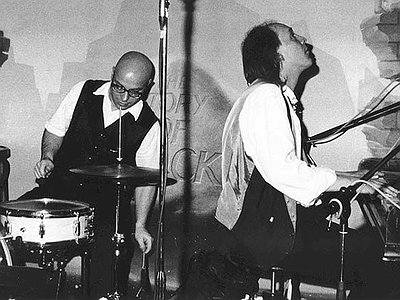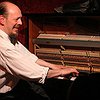Keith Rowe once asserted that it is often certain people that “give one permission to do things”. How was that for you – in which way did the work of particular artists before you “allow” you to take decisions which were vital for your creative development?
Absolutely important! It seems as if the words are not strong enough. Without a lot of other artists I would not be able to do what I am doing. I need to mention Arvo Pärt, he did and does things one would not expect to work. For example 'Spiegel Im Spiegel' is almost ridiculously simple.
Cecil Taylor seems to play anything that comes to his mind. Even Keith Jarrett or his brother Chris Jarrett sometimes use the piano as a percussion instrument. There are so many wonderful musicians, or should I call them magicians, out there.
For me Bugge Wesseltoft needs to be mentioned here or Nils Petter Molvaer. I didn’t know that combining jazz and electronic music would work that perfectly. Alexander von Schlippenbach is one figure I need to mention here; having discovered him or some of his recordings allowed me to do almost anything.
But also Philip Glass, Branka Parlic and Erik Satie 'allowed' me to do what I assume is 'right'.
The last album of the Esbjörn Svensson Trio 'Leucocyte' really knocked me out. The most important figure I must mention here maybe is John Coltrane. Just listen to the last two or three albums he made before his death. One is recorded only with drums and sax – absolute freedom!
What are currently your main artistic challenges?
At this time I'm trying to find ways to put all my different music styles together. I hate to be a Boogie-Pianist one day; an improvisator the next day and electronic musician the other day. What I am really searching for is just Henning Pertiet.
The last months seem to be important because I feel that something deep inside of me seems to have changed the way I 'see' the different music styles within me. I still have to go on without knowing what it will bring, but it feels as if there's a kind of a solution near.
What do improvisation and composition mean to you and what, to you, are their respective merits?
A composition can help me in a certain situation; for example in a concert it's nice to have something you can just use without the need to improvise. But to me, improvisation is something that gives me freedom in a world where I am not free all the time.
How important are practising and instrumental technique for achieving your musical goals?
Maybe they are not important at all. Of course I have been told that one needs to be good on the instrument one is playing. But what does this mean?
There are lots of people who don’t play any traditional instruments but make great music, for example Brian Eno. There are lots of people who can play technically but can't make music.
I try to practise less. Or maybe the other way around: I try to practise what I really need. I need more self-confidence, I need more time while playing. I don’t mean I need more than two hours for example but within this time I would need the feeling of having time.
Even in blues, which was and is my main business, it's not important to be a trained musician. You can play a million notes, and play them perfectly without moving or touching ones feelings. So the question to me is what is it worth?
On the other hand I often ask myself if maybe I have this opinion because I am not the best technically? I really don’t know…
But you can also say that one who has practised less and is less trained in a classical way must sound more personal, which is not bad. It's possible that if you have something to say, you could do it with or without technical ability. When it MUST get out of you it probably will.
Do you feel it important that an audience is able to deduct the processes and ideas behind a work purely on the basis of the music? If so, how do you make them transparent?
My opinion is that audiences need to feel good, have a good time, maybe leave reality for a while. If someone needs to explain my music intellectually it's ok but not something I would care for. It's because I can’t explain it myself and do not feel the need.
People can even think what they want during performances or when listening to recordings. To be honest, I love the idea of just giving numbers to compositions / recordings. Or maybe just a date. I have a certain feeling while playing, but others don’t have to feel the same. When I give my records certain names, it's because I am not as free as I wish I could be. I should start doing this today.
To be honest I have played with a lot of singers and I almost never understood what they where singing about – and I'd go even further: I don't care much. It is often similar when talking to people: my opinion is that most people talk a lot of nonsense because they're afraid of saying what they REALLY want to say. Most writing or song writing is similar. This surely is a view that might not be very popular – but that's the way I see it.





